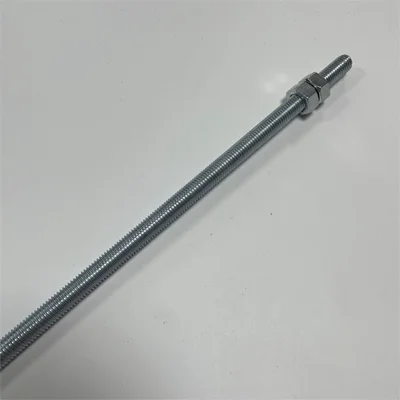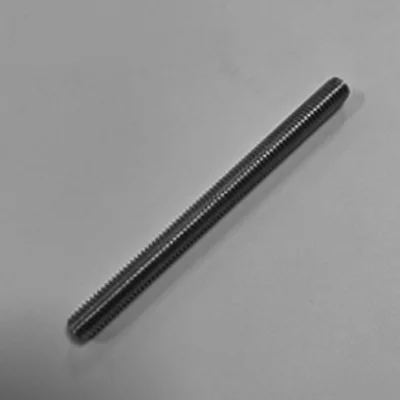caTEGORIES
Tags
How Do Different Materials Impact the Strength of Threaded Rods?

Posted: August 08, 2025
Categories: News
Tags: news
Threaded rods and studs are super important in many industries. You can find them in big buildings, energy systems, machines, and strong anchors. But not all threaded rods are the same. The stuff they’re made from changes how strong they are, how well they resist rust, and how they work overall. Picking the right material is key to keeping things safe, strong, and long-lasting.
QEWIT, a top global supplier of high-quality fasteners, offers a huge range of threaded rods and studs. We have them in carbon steel, stainless steel, brass, copper, and special alloys. Plus, we provide strong coatings, certifications, and custom options to fit your needs. This article explains how different materials affect threaded rod performance. It also gives you a simple guide to choosing the best type for your project.
Common Materials Used in Threaded Rods
Carbon Steel
Carbon steel is one of the most popular choices for threaded rods. It’s used a lot in grades like 4.8, 8.8, 10.9, and 12.9. People love it because it’s strong and doesn’t cost too much.
- Strength: The strength depends on the grade. Higher numbers mean stronger rods. For example, Grade 8.8 rods work well for general building projects. Grades 10.9 or 12.9 are great for jobs needing lots of force.
- Uses: Big structures, supports, machine joints, and equipment bases.
- Downside: Carbon steel can rust if it’s not coated.
QEWIT offers carbon steel threaded rods with coatings like Zinc Plating (BZP), Hot-Dip Galvanizing (HDG), Geomet, and Zinc Flake. These coatings help stop rust and make the rods last longer.
Stainless Steel (Grades A2-70, A4-80)
When you need rods that won’t rust, stainless steel is the way to go.
- A2-70 (Grade 304): Great at fighting rust in indoor or slightly tough environments.
- A4-80 (Grade 316): Even better for harsh places like the ocean, chemical plants, or humid areas.
- Strength: Not as strong as high-grade carbon steel, but it holds up well over time because it doesn’t rust.
You’ll see stainless steel threaded rods in food equipment, beachside buildings, water treatment plants, and medical machines. QEWIT’s stainless steel fasteners meet DIN and ISO standards. We can provide 3.1 certification if you ask.
Brass and Copper Alloys
Brass and copper alloy rods aren’t used for heavy jobs, but they’re perfect for special tasks.
- Advantages:
- They carry electricity well.
- They don’t mess with magnets.
- They look nice in fancy designs.
- Uses: Power systems, electrical connections, and high-tech setups.
How Do Different Materials Impact the Strength of Threaded Rods?
Threaded rods and studs are really important in many fields. You see them in huge buildings, power systems, machines, and heavy anchors. But not every threaded rod is the same. The stuff they’re made of changes how strong they are, how well they fight rust, and how they work overall. Choosing the right material keeps things safe, sturdy, and long-lasting.
QEWIT, a top global supplier of great fasteners, has a big selection of threaded rods and studs. We offer them in carbon steel, stainless steel, brass, copper, and special alloys. We also give strong coatings, certifications, and custom options to meet your needs. This article talks about how different materials affect threaded rods. It also shares an easy guide to picking the best one for your job.
Common Materials for Threaded Rods
Carbon Steel
Carbon steel is a super common choice for threaded rods. It’s used a lot in grades like 4.8, 8.8, 10.9, and 12.9. People like it because it’s tough and not too pricey.
- Strength: Strength depends on the grade. Higher numbers mean stronger rods. Grade 8.8 rods are good for regular building work. Grades 10.9 and 12.9 are awesome for heavy-force jobs.
- Uses: Big structures, supports, machine connections, and equipment bases.
- Problem: It can rust without a coating.
QEWIT provides carbon steel threaded rods with coatings like Zinc Plating (BZP), Hot-Dip Galvanizing (HDG), Geomet, and Zinc Flake. These help stop rust and make rods last longer.
Stainless Steel (Grades A2-70, A4-80)
When rust is a big worry, stainless steel rods are the best pick.
- A2-70 (Grade 304): Really good at stopping rust indoors or in mildly tough places.
- A4-80 (Grade 316): Even better for rough spots like the sea, chemical plants, or wet areas.
- Strength: Not as strong as top-grade carbon steel, but it stays steady over time because it doesn’t rust.
Stainless steel rods are used in food machines, beach buildings, water plants, and medical equipment. QEWIT’s stainless steel fasteners follow DIN and ISO rules. We offer 3.1 certification if you need it.
Brass and Copper Alloys
Brass and copper rods aren’t for heavy jobs, but they’re great for special tasks.
- Good Things:
- They carry electricity well.
- They don’t affect magnets.
- They look nice for fancy designs.
- Uses: Power systems, electrical parts, and high-tech setups.
QEWIT makes exact brass threaded parts for standard or custom needs with different thread styles.
Aluminum and Light Alloys
For jobs where weight matters more than strength, aluminum rods are a light, rust-proof choice.
- Uses: Aerospace parts, electronic cases, or temporary setups.
- Warning: They’re not as strong or tough for heavy or structural jobs.
QEWIT can make aluminum threaded rods by forging or CNC machining based on your designs.

How Strong Are They? Strength vs. Use
Strength Grades Explained
Here’s a simple table showing how strong different materials are:
| Material | Grade | Strength (MPa) |
| Carbon Steel | 4.8 | ~400–500 |
| Carbon Steel | 8.8 | ~800 |
| Alloy Steel | 10.9 | ~1040 |
| Alloy Steel | 12.9 | ~1220 |
| Stainless Steel | A2-70 | ~700 |
| Stainless Steel | A4-80 | ~800 |
Higher grades are better for tough jobs like big steel structures or machines. QEWIT supports all standard grades and tests strength in-house to meet ISO9001 and PPAP rules.
Coatings and Long-Lasting Power
The material isn’t the only thing that matters. Coatings help rods last longer by fighting rust.
QEWIT offers:
- Hot-Dip Galvanizing (HDG): Thick zinc layer for outdoor or structural use.
- Geomet/Zinc Flake: Thin coating that beats salt spray tests.
- Bright Zinc Plated (BZP): Cheap protection for indoor use.
- Mechanical Galvanized or Black Oxide: Special coatings for unique needs.
In salt spray tests, QEWIT’s Geomet-coated rods last over 1000 hours—10 times longer than regular zinc plating.
Examples of Uses by Material
| Job | Best Material | Why It’s Good |
| Steel structure base fixing | Carbon Steel 8.8 / 10.9 | Strong with HDG for outdoor use. |
| Marine/Coastal setups | Stainless Steel A4-80 | Fights saltwater rust well. |
| Electrical connections | Brass / Copper Alloy | Great for electricity and non-magnetic use. |
| Lightweight machine brackets | Aluminum Alloy | Light when strength isn’t a big need. |
| Chemical plant pipe supports | Stainless Steel A4 | Handles acidic places without rusting. |
Why Pick QEWIT for Threaded Rods?
QEWIT isn’t just a supplier—we’re your partner. Here’s what makes us special:
- Lots of Materials: From carbon steel to copper alloys.
- Custom Work: Made to your drawings.
- Testing & Certificates: ISO9001, 3.1, PPAP, ISIR.
- Fast Delivery: 1–2 weeks for main fasteners.
- Global Shipping: EXW, FOB, CIF, or DDU options.
- Easy Packaging: Pre-sorted kits to save time.
With over 30,000 SKUs, QEWIT handles big orders, technical jobs, and just-in-time delivery worldwide.
Wrapping It Up
The strength and performance of threaded rods depend on their material, grade, and coating. Whether you need strong studs for big steel projects or rust-proof rods for ocean settings, knowing your material choices is super important.
QEWIT helps industries worldwide with top-notch threaded rods and great support. Choose strength. Choose trust. Choose QEWIT.
FAQS
Q1: Can QEWIT give material certificates for threaded rods?
A: Yes! We provide ISO 9001 quality assurance, 3.1 certificates, and PPAP/ISIR papers if you ask.
Q2: What’s the difference between 8.8 and A2-70 rods?
A: Grade 8.8 carbon steel is stronger. A2-70 stainless steel is better at fighting rust.
Q3: Do you make custom threaded rods?
A: Totally! QEWIT builds rods to your drawings or samples with custom materials, coatings, and sizes.


